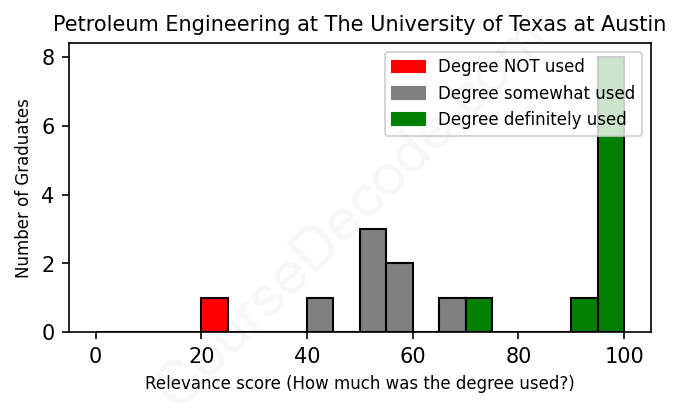
First, some facts. Of the Petroleum Engineering graduates from The University of Texas at Austin we've analyzed , here's how many have used (or NOT used) their degree in their career:

These are estimates based on AI analysis of 18 LinkedIn profiles (see below).
The verdict? Above average. Overall, with an average relevance score of 75%, Petroleum Engineering graduates from The University of Texas at Austin have a higher likelihood (+8%) of finding work in this field compared to the average graduate across all fields:
And for comparison, here's the chart for all profiles we've looked at across all degrees.
Also, after graduating, only 22% of these graduates have pursued further education other than another Bachelor's degree (such as a Masters degree or other), compared to the average across all profiles of 35%. This suggests a Bachelors degree is enough for most Petroleum Engineering graduates, and it's normal to look for work straight after graduation.
See the details:
|
Relevance score: 50% We think this person has gone into a career only somewhat relevant to their degree. We think this person has gone into a career only somewhat relevant to their degree.
DEGREE INFOGraduated in 2016 from The University of Texas at Austin with a Bachelor of Science (B.S.) in Petroleum Engineering. Also pursued further education since (see below). JOB HISTORY SINCE GRADUATIONGraduate Engineer The Weir Group PLC Sep 2017 - Jan 2020 Strategic Sourcing  SPM Oil & Gas Jan 2020 - Feb 2021 Strategic Sourcing Lead  Caterpillar Inc. Feb 2021 - Present FURTHER DEGREES DONE SINCE GRADUATINGMaster of Science - MSThe University of Texas at Dallas 2022 - 2023 ABOUTNo information provided. |
The top 10 most common jobs done by the graduates we've analyzed (ranked most common to least) are:
When looking at the career paths of graduates with a Petroleum Engineering degree from The University of Texas at Austin, it seems like most of them ended up in jobs that are pretty closely related to their field. Many of them have taken roles like Petroleum Engineer, Reservoir Engineer, and Production Engineer at well-known companies in the oil and gas sector, like Chevron, ExxonMobil, and Occidental Petroleum. These positions directly utilize the technical skills and theoretical knowledge they gained during their studies, making them highly relevant to their degree. For instance, various roles such as Completions Engineer and Operations Engineer clearly apply the principles of petroleum engineering on a day-to-day basis and involve critical thinking about resource management and extraction technologies.
However, it's not all directly tied to petroleum engineering. Some graduates ventured into positions that don’t strictly require their specialized knowledge, like roles in consulting or sales, where they might only use general engineering skills or soft skills. That's more common among those who transitioned into broader business-related roles. So, while many graduates managed to secure jobs that align with their training in petroleum engineering, a significant portion moved into areas that don’t fully leverage their education. Overall, it seems that a good number still find their footing in petroleum-focused roles, which bodes well for their future in this field!
Here is a visual representation of the most common words in job titles for Petroleum Engineering graduates (this is across all Petroleum Engineering graduates we've analyzed, not just those who went to The University of Texas at Austin):

Graduates from the Petroleum Engineering program at The University of Texas at Austin generally have a solid start to their careers. Many of them land their first jobs in roles directly related to petroleum engineering, such as completions engineers, reservoir engineers, or field engineers, often with major companies in the oil and gas industry, like Occidental Petroleum and Chevron. These early positions indicate that alumni are typically able to secure jobs relevant to their degree right out of college, which is a good sign for anyone considering this path. For instance, several graduates who entered the workforce around 2011 quickly climbed the ranks, taking on more responsibilities as they gained experience, which seems to be the trend for many in this field.
Five to ten years down the line, the career trajectories appear to diverge a bit. While many continue to advance in engineering roles, some have transitioned into management or specialized positions, showcasing their growth within the industry. Others, however, have moved into seemingly unrelated fields, such as consulting or positions in other industries, though many still carry skills and experience from their engineering backgrounds. Overall, while it’s clear that a large number of UT Austin Petroleum Engineering graduates are finding success and relevance in their career paths, the diversity in job roles a few years down the line suggests that some may explore opportunities outside traditional petroleum engineering roles as their careers evolve. Nevertheless, the foundation laid by their engineering degrees seems to provide a strong stepping stone for whatever direction they choose to take.
So, diving into a Bachelor’s degree in Petroleum Engineering at The University of Texas at Austin isn't a walk in the park, let me tell you! It's generally considered to be on the tougher side, which makes sense since it deals with complex stuff like thermodynamics, fluid mechanics, and geology—basically a mix of math, physics, and a good bit of chemistry. The coursework can be pretty rigorous, with a lot of problem-solving and projects that push you to really understand how the oil and gas industry works. If you enjoy tackling challenging material and have a strong interest in the subject, then you might find it rewarding, but be prepared for some late nights and tough tests along the way!
Most commonly, in the LinkedIn profiles we've looked at, it takes people 4 years to finish a Bachelor degree in Petroleum Engineering.
From what it looks like, those Petroleum Engineering graduates from The University of Texas at Austin have ended up in pretty solid positions that likely earn them decent pay. Graduates working for big names like ExxonMobil, Chevron, and Occidental Petroleum tend to rake in good salaries; even entry-level roles in this field usually come with a nice paycheck right out of college. Taking a peek at their career paths, a lot of them climbed the ladder to managerial or specialized roles pretty quickly, which generally means even better money. So yeah, if you're thinking of going into this field, it seems like a smart move if you want to make some good cash!
Here is a visual representation of the most common words seen in the "about" section of LinkedIn profiles who have a Bachelor degree in Petroleum Engineering (this is across all Petroleum Engineering graduates we've analyzed, not just those who went to The University of Texas at Austin). This may or may not be useful:

Here are all colleges offering a Bachelor degree in Petroleum Engineering (ordered by the average relevance score of their Petroleum Engineering graduates, best to worst) where we have analyzed at least 10 of their graduates:
| College | Score | Count |
|---|---|---|
 Texas A&M University Texas A&M University
|
80 | 25 |
 Louisiana State University Louisiana State University
|
79 | 26 |
 University of Oklahoma University of Oklahoma
|
78 | 20 |
 Texas Tech University Texas Tech University
|
77 | 20 |
 Penn State University Penn State University
|
75 | 11 |
 The University of Texas at Austin The University of Texas at Austin
|
75 | 18 |
 Marietta College Marietta College
|
70 | 20 |
 Colorado School of Mines Colorado School of Mines
|
69 | 30 |
 West Virginia University West Virginia University
|
68 | 10 |
 University of Houston University of Houston
|
67 | 19 |
 University of Louisiana at Lafayette University of Louisiana at Lafayette
|
63 | 10 |